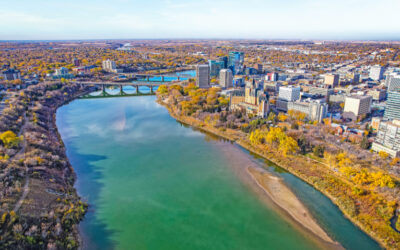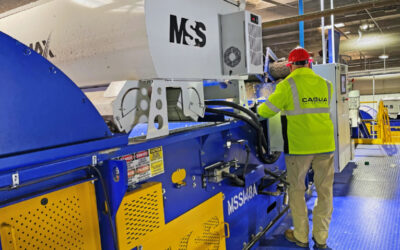Located in central Massachusetts, Devens is a regional enterprise zone perfect for businesses looking to boost their eco-efficiency as they grow. The 4,400-acre former army base, which is less than an hour’s drive from Boston and 35 minutes from Worcester, has been repurposed as a model of sustainable development. Within three years, the community, named for Civil War General Charles Devens, will be LEED certified to the newest standards.
~
This universally recognized U.S. Green Building Council (USGBC) standard means Devens will meet the modern requirements under LEED for Communities version 4.1. Devens has been working to become an environmentally friendly haven for booming businesses since 1996, when Fort Devens was closed and turned over to the Commonwealth of Massachusetts for redevelopment.
One unique feature that makes this historic, self-contained community of engaged residents and thriving world-class businesses so desirable is its eco-industrial park. The fully serviced industrial park, accessible via public transportation, provides a space for businesses to conduct by-product exchanges and improve efficiency. These exchanges are facilitated by the Devens Eco-Efficiency Center, a one-of-a-kind nonprofit that offers educational forums, technical assistance, networking venues, and partnership opportunities to keep the community’s businesses running smoothly.
For instance, while a local aircraft company was receiving its components with packing peanuts, a machine tool company, Waiteco Machine, Inc., was buying peanuts to use in packaging. The Eco-Efficiency Center bought two 96-gallon toters that allowed for the companies to arrange swaps. Nothing enters the landfill, and both companies are now saving money: a win-win.
Since its launch in 2007, the Eco-Efficiency Center has extended beyond Devens throughout the eastern Massachusetts region, saving businesses more than $6.2 million in reduced operating expenses as one firm’s waste stream becomes another firm’s raw materials resource.
Also located in the eco-industrial park is the Devens Recycling Center, which performs construction and demolition debris recycling. The center repurposes approximately 1,500 tons of material a year from the region, including steel, gypsum, and wood chips. These products are shipped by rail, helping reduce traffic impact, as each rail car removes four 16-wheelers from the road.
“The Devens Recycling Center is an example of providing an ecological systems approach to an industrial park. You need bottom-feeders – scavengers – to clean up the system, and the Center fits really well into that role. They originally located in Devens because we positioned ourselves as an eco-industrial park,” explains Peter Lowitt, Director of the Devens Enterprise Commission (DEC).
Moreover, all Devens properties feature 75-day permitting and access to low-cost utilities. This unified, expedited permitting system allows businesses to avoid going through a number of boards and commissions before receiving approval. “We permitted a 100-acre corporate campus for Bristol-Myers Squibb in 36 days. Our average for permitting a project is about 56 days,” Lowitt tells us. Bristol-Myers Squibb (BMY:NYSE) is a pharma giant that features sustainable development as part of its mission statement. Having its mission aligned with that of Devens helped the community attract its $1.25 billion investment.
“We don’t just regulate. We provide a mix of incentives, guidelines, and regulations to foster more sustainable approaches to development,” remarks Neil Angus, DEC Environmental Planner.
For example, Devens regulations specify that all storm water management is done through low-impact development techniques, and the DEC educates businesses on how to meet these requirements with case studies. Meanwhile, a rebuilding incentive program provides a certain amount of funds and waivers toward a development if it goes through LEED’s green building certification. Devens achieved LEED for Communities status in 2018, and is now working toward certification in version 4.1.
“Devens also collaborates with institutions of higher learning to help our businesses reach their environmental goals.” Each year, the Eco-Efficiency Center invites the University of Massachusetts’ Industrial Assessment Center to present at a roundtable. As a result of these training sessions, several small- and medium-sized firms have taken advantage of the University’s free comprehensive assessment of energy use to identify opportunities to gain efficiency. This audit, sponsored by the U.S. Department of Energy, highlights areas worthy of mid- to short-term investment.
Another success story is that of Little Leaf Farms, a local business that provides lettuce to school systems and supermarkets. The hydroponic baby lettuce operation has over 200,000 square feet of greenhouse space that is automated to grow produce, untouched by human hands. The irrigation water for the crop is harvested from the roof runoff into an on-site basin. This is much more sustainable than importing lettuce from California, which takes five to seven days to arrive and is grown in an arid climate where water is scarce. At the moment, the owner is in the process of constructing an additional 200,000 square feet of greenhouse.
The boom in the automation and robotics sectors has certainly opened connections with local educational institutions. Mount Wachusett Community College is located within a former military intelligence building across the street from Bristol-Myers Squibb, which partnered with the college to make a bio-manufacturing training certificate program by renting out their lab space and giving on-the-job training to people right across the street. “Having jobs and education close to each other is a great asset,” Angus says.
Industries that thrive in Devens include life sciences, technology, advanced manufacturing, and distribution centers that are able to take advantage of the community’s rail connections. The eco-industrial park is also home to New England Studios, an 64,000+ square-foot movie and TV production facility that shoots for Hulu and Netflix, occasionally filming around the scenic community.
In total, Devens’ 5,500 employees earn above the median salary of the state. To accommodate workers as they commute to their desirable jobs, the DEC and its redevelopment partner MassDevelopment, in collaboration with the Montachusett Area Regional Transit and local businesses and communities, have arranged an employee shuttle from the surrounding communities of Fitchburg and Leominster. The service even connects to the Boston Metropolitan Area through the MBTA (Massachusetts Bay Transportation Authority) Fitchburg Line Commuter Rail, reducing the environmental impact of single-occupancy trips.
Of course, for those who desire to skip the commute and live within Devens itself, there is much to offer. Over one-third of the 4,000-plus-acre Devens community is protected open space. As Lowitt says, the high-quality development that the business-friendly enterprise zone has undergone resembles a park more than anything else, with an 18-hole certified-sustainable golf course, 150 acres of recreational playing fields, a lake for canoeing or kayaking, and 13 miles of trails. To top it off, the community is bordered by the lovely Nashua River.
In 2012–2013, Devens completed a cost-sensitive net-zero housing pilot project, developing eight single-family homes and 12 multi-family homes that could meet USGBC standards of generating as much energy as they consumed in a given year, leading to a net-zero effect on the environment. The pilot exceeded expectations, producing more energy than the houses consumed. The DEC then drafted new regulations to address energy efficiency holistically throughout entire neighborhoods. This led to the completion of another 17 units in 2018 – phase 1 of Emerson Green – built under the new regulatory plan.
At the moment, another 80-plus net-zero housing units are in Devens’ pipeline. Phase 2 has just begun and will be a mix of single-family units, duplexes, triplexes, quadplexes, and a 40-unit apartment building. This phase will feature neighborhood parks designed for connectivity and walkability.
“We want to continue to be a leader in innovation and sustainable development, and to continue to create a ‘live, work, play, learn’ community that the Commonwealth of Massachusetts can be proud of,” adds Lowitt.
In order to meet its goals of the most up-to-date LEED standards in the near future, Devens is undertaking a greenhouse gas inventory, which is to become part of a Climate Action and Resiliency Plan that is projected to be completed by May 2020. Before LEED merged with the STAR Community rating system in 2018, the latter identified that Devens lacked a comprehensive analysis of its greenhouse gas emissions. The community is currently rectifying this in preparation for third-party certification through the USGBC’s LEED v4.1 rating system.
Once that is in place, Devens will be able to accurately identify its emissions rate and target any areas of weakness. Right now, approximately 12 percent of the total energy used in Devens is generated renewably, mainly through onsite solar energy capture, and a small component from wind power. By tracking its emissions, this percentage is likely to increase.
“We’re excited about this work and are hoping it will help us to grow our already robust renewable energy portfolio in Devens. Renewable energy is going to play a big role and we will continue to grow that 12 percent to a much greater number,” Angus describes.
Devens will also improve its livability through its Complete Streets program, which was implemented a couple of years ago. The program analyzes existing infrastructure for all different modes of transportation: by foot, bike, stroller, or wheelchair, considering the right of way for all users and not just cars and trucks. This new policy requires the incorporation of “Complete Street” designs into all Devens’ retrofits. The DEC conducted a prioritization plan with MassDevelopment to help create a more accessible, connected network of streets as the community grows.
Finally, Devens will increase its urban tree canopy cover. DEC and MassDevelopment are researching planting programs, recognizing the multiple benefits of an urban canopy and street tree cover: the reduced heat island effect, storm water management, extended pavement life, and, of course, air quality improvement. As Angus points out, “Trees are Mother Nature’s air filters.” Increasing Devens’ tree canopy will holistically help Devens meet its Climate Action Plan targets and boost quality of life for residents, while also helping businesses and wildlife.
Once the DEC’s greenhouse gas inventory is complete, it will invite a group of stakeholders to move forward in its integrated, inclusive, and comprehensive Climate Action Plan. “These are measures we are taking not only to get LEED certification, but also to contribute to our sustainable redevelopment goals and mission. All of this helps us foster partnerships with surrounding communities,” Angus adds.
Many social services in Devens are regionally supportive, including veterans’ housing, a shelter for homeless women and children, a local food pantry, an adult daycare, a children’s daycare, and a critical care facility for people with substance abuse and psychiatric disorders – a huge unmet need in the state. Providing social services is another way of meeting Devens’ sustainable redevelopment goals and supporting the triple bottom line: economic, environmental, and social factors.
“It is about balance,” Peter Lowitt concludes, “balancing environmental protection, economic development, and social equity.”
To find out whether Devens is the right place for your business, contact the Devens Enterprise Commission at devensec.com or learn more at devensbusiness.com.













